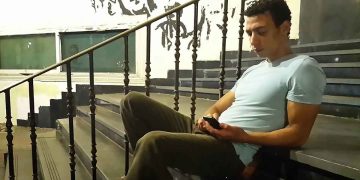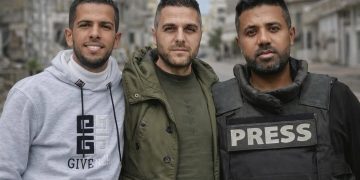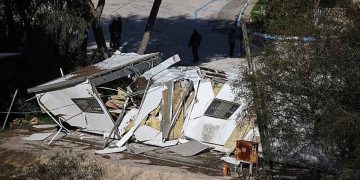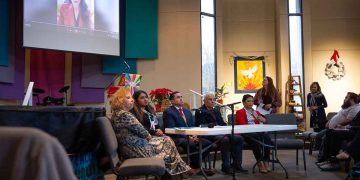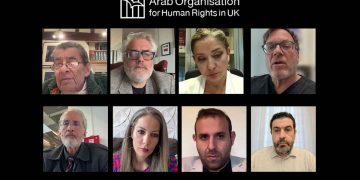On Tuesday evening, 10th September 2024, Arab Organisation for Human Rights in the UK (AOHR UK) hosted a webinar titled “Halting the Arming of the Israeli Occupation: UK’s Partial Suspension as a Step, But Not Enough.” The event brought together a panel of distinguished speakers, including Kirsten Bayes, Senior Campaigner at Campaign Against Arms Trade (CAAT); Professor Haim Bresheeth, a Jewish historian and filmmaker; Craig Murray, former British diplomat; and Stefano Apuzzo, former member of the Italian Parliament. The webinar explored the implications of the UK’s partial arms suspension to Israel and called for greater international action to stop the genocide in Gaza.
Kirsten Bayes, Senior Campaigner at CAAT, opened her remarks by placing the UK’s arms exports to Israel within the broader context of international military aid, specifically highlighting that Israel receives approximately $3.8 billion annually from the United States in military aid. Most of this, Bayes explained, is used to purchase U.S. military systems, particularly military aircraft such as the F-35 and F-16. She emphasised that the UK’s role in arming Israel revolves around supplying components that help build and maintain these U.S.-made aircraft, making the UK a key player in their operational capability.
Bayes noted that 15% of the F-35, a warplane produced by Lockheed Martin, is built by the UK. In light of this, she argued that the UK’s partial embargo on arms exports to Israel, which involved the blocking of 30 out of 350 licenses, is important. This move, she said, signals a form of disapproval from the UK government, acknowledging the risk of these weapons being used in violation of international humanitarian law. She translated this “risk” into more tangible terms for the audience: the potential for these arms to be used to bomb schools, hospitals, homes, and refugee centres in Gaza.
While she acknowledged that the embargo was a step in the right direction, Bayes expressed concern that the UK’s role in supporting the F-35 aircraft—despite its involvement in recent mass civilian casualties, such as the bombing in al-Mawazi’s supposed safe zone—remained largely untouched. She pointed out that the use of £2,000 bombs by F-35s had led to the deaths of around 90 people, and yet the UK’s involvement in the production of these aircraft was still ongoing.
Bayes argued that the UK’s position was untenable, given that it was willing to suspend some arms exports but continue supplying components for aircraft that have been used against civilians. She voiced disappointment that the UK government was still enabling the continued use of these weapons.
In a broader historical context, Bayes also challenged the narrative that the Israeli occupation and violence against Palestinians began with the October 7th attacks, a framing favored by the Israeli government. She reminded the audience that Western arms exports have long supported the occupation of the West Bank and the system of apartheid, which has been ruled against by the International Court of Justice (ICJ). The UK, she argued, should be blocking all arms exports that support the occupation in the West Bank and East Jerusalem in compliance with international law.
Bayes concluded this portion of her remarks by acknowledging that while the arms embargo was a positive step, it was far too limited to have the desired effect. The embargo covers only a small proportion of UK weaponry, and thus, she expressed disappointment that it came only after a year of mass casualties.
When asked about the reasoning behind the UK’s arms embargo, Bayes attributed the move to public pressure from the pro-Palestine movement and human rights advocates. She framed the embargo as a minimal response from the government—just enough to claim compliance with international humanitarian law, but not enough to meaningfully halt the UK’s role in the violence. She highlighted the blocking of drone components as a key concession to campaigners but criticised the government for leaving significant loopholes that would allow arms exports to continue.
Regarding the timing of the embargo, Bayes speculated that it was likely influenced by the recent UK election and the growing electoral potency of the Palestine issue. She pointed out that several MPs were elected on a platform centered around Palestine, and this pressure may have forced the government to act. Additionally, Bayes noted that UK Foreign Secretary David Lammy had previously called for the legal guidance on arms sales to Israel to be published, and this might have contributed to the government’s decision.
Bayes then shifted to discussing what individuals could do to combat the arms trade and support Palestine. She encouraged people to engage in actions ranging from writing to MPs to participating in direct action against arms shipments. She acknowledged that those engaging in direct action had been arrested under terrorism legislation, but she defended their efforts as necessary in the face of genocide. Bayes emphasised the importance of continuing to pressure the government and arms companies, even if individuals could only take small actions.
In addressing the killing of British aid workers earlier in 2024, Bayes pointed out the use of UK-made drone technology in these attacks. She reflected on the fact that while the deaths of British aid workers sparked significant media attention, the deaths of over 100 Palestinian aid workers had largely gone unnoticed. Bayes emphasised the need to highlight all loss of life, Palestinian and Western, and urged the audience to turn their focus to the broader tragedy unfolding in Gaza and the West Bank.
She concluded by urging people to support those taking action—whether through legal challenges or protests—and to continue raising awareness about the arms trade’s role in the genocide in Gaza.
Professor Haim Bresheeth, a Jewish historian and filmmaker, began by affirming his agreement with Kirsten Bayes‘ earlier remarks. He then directed sharp criticism at UK Prime Minister Keir Starmer, accusing him of supporting the genocide in Gaza by, from the beginning, endorsing Israel’s right to defend itself. Bresheeth highlighted that this defence has included measures such as starvation, denial of medicine and fuel, and relentless bombing. He argued that Starmer has effectively supported genocide, rendering him vulnerable to accusations of complicity in these atrocities.
Bresheeth then referenced the Genocide Convention, emphasising that it criminalizes not only the supply of arms but any form of support for genocide. He pointed out that Starmer had made multiple statements endorsing Israel’s actions, further entrenching his complicity in the genocide.
He went on to mention that following the International Court of Justice’s (ICJ) May decision, which responded to the UN’s request for a legal opinion on the Israeli occupation, the UK government felt compelled to take minimal action to distance itself from directly supporting genocide. Bresheeth reiterated that the UK’s partial suspension of arms exports was the least it could do, describing the move as a symbolic gesture that did not stop Israel’s ability to commit genocide, “The move is basically a presentation rather than a real move to stop the important weapons supplied to Israel. It’s symbolic, but it’s a move of a new government coming in and playing a new broom. We are going to do what the other government hasn’t done,” he said.
Drawing a historical parallel, he reminded the audience that the U.S. and the UK were the last two countries to support apartheid in South Africa until just before its collapse. He predicted that the same would happen with Israel. While the UK’s action was largely symbolic, Bresheeth highlighted that Israel continues to carry out genocide, particularly using heavy bombs, such as those delivered by F-35s, which have caused widespread civilian casualties. He also criticised the notion of “safe zones” in Gaza, stating that Israel bombed areas where Palestinians had been directed to seek refuge, leaving no genuinely safe place in Gaza. “They are fighting the universities. They’re fighting the hospitals. They’re fighting the mosques. They’re fighting community centres. They’re fighting the water.”
Bresheeth expanded the scope of the discussion by pointing out that the UK is not alone in supporting Israel. He emphasised that the entire Western bloc is complicit in Israel’s genocide, asserting that it is unprecedented for a country to carry out genocide so publicly, with full global media coverage, while still enjoying Western support. He noted that even the Israeli army admitted this week to lying about certain aspects of the war, yet the West continues to echo Israeli propaganda. While the UK’s symbolic move might prompt other countries to reconsider their arms exports to Israel, Bresheeth expressed scepticism, especially about the U.S., given its long-standing vetoes at the UN and its unwavering support for Israel since 1948.
Bresheeth expressed frustration with the slow progress of efforts to reform the UN, particularly the veto powers held by the U.S. and its Western allies. He suggested that while BRICS nations are pushing for change, their efforts are too slow, and if more decisive action isn’t taken soon, there may be no Palestinians left to save in Gaza.
He also criticised the Arab world for failing to play a more active role in stopping the genocide. Bresheeth noted that while some governments have negotiated ceasefires, these efforts are largely ineffective due to U.S. support for Israel and Netanyahu’s manipulation of the situation. He stressed that Arab populations, unlike their governments, expect more active efforts to stop the genocide, and he called for greater engagement from Arab leaders, despite the pressure they face from the West.
Professor Bresheeth called for deep changes to the UN, including the removal of veto powers and a restructuring of the organization to make it more effective in preventing genocides. He described the UN as an “ineffable and ineffectual” organization and argued that without reform, international law would continue to be undermined.
When asked about the significance of the UK’s recent decision to suspend some arms exports to Israel, Bresheeth dismissed it as largely symbolic. He framed it as a move by a new government trying to appear more active after years of inaction under the previous Tory administration. He attributed the decision to pressure from the ICJ and noted that the UK’s suspension of 8% of its arms exports was minimal, particularly considering the scale of Israel’s arms imports. Bresheeth reiterated that only a full suspension of arms exports would constitute meaningful action and criticised the UK for using this limited move as a defence against accusations of supporting genocide.
He then reflected on the potential for other European countries to follow the UK’s example. While he dismissed the possibility of the U.S. changing its policies due to the power of the Israel and arms industry lobbies, Bresheeth noted that there are growing movements in countries like Ireland, Spain, and even France to reconsider their arms exports to Israel. He mentioned Italy as another potential candidate for change if other countries join the UK in halting arms sales altogether, though he expressed doubts about Germany following suit due to its role as a major arms supplier to Israel.
Shifting focus to the Arab world, Bresheeth pointed to the failed revolutions of 2011, which had demonstrated the Arab populations’ desire for democracy and justice, including support for Palestine. He argued that while the Arab people still desire democratic reforms and justice for Palestinians, regimes in countries like Egypt, Jordan, and the Gulf have silenced opposition, rendering them ineffective in the struggle against Israeli apartheid and genocide. He called for renewed efforts by Arab populations to pressure their governments into taking stronger action.
Bresheeth then emphasised the importance of unions in this fight, particularly in the UK, where large unions like Unite have progressive positions against Zionism but have failed to act due to resistance from their leadership. He encouraged activists to pressure their unions to take concrete steps in support of Palestine, as unions in Palestine have done by pushing the Palestinian Authority to prioritize Palestinian security over Israeli interests.
He also criticised Europe and the U.S. for providing disproportionate financial support to Israeli research, which he argued is primarily military in nature. Bresheeth described this as a form of indirect military support for Israel and called for an end to European funding of Israeli military research.
Finally, Bresheeth addressed the Western media’s role in perpetuating Israeli propaganda, criticizing outlets like the BBC for their biased coverage of the war. He urged activists to challenge the media’s silence on the genocide in Gaza and to demand accurate reporting. Citing a study in The Lancet, Bresheeth suggested that the real death toll in Gaza could be ten times higher than the official figures, potentially as high as 560,000 people, and he highlighted the sheer volume of bombs dropped on Gaza, which he said was twice as much as the Nazis dropped on Britain during World War II.
Bresheeth concluded by calling for a total academic boycott of Israel, pointing out that every university in Gaza had been destroyed, along with 150 professors killed. He emphasised that Israel’s attack on Palestinian education is part of its broader genocidal campaign and urged academics worldwide to sever all ties with Israeli institutions.
Craig Murray, a British former diplomat, began his speech by describing the UK government’s recent arms suspension to Israel as a “defensive move.” He explained that government ministers were primarily concerned with protecting their own positions, having received strong internal advice from legal advisors within the Foreign and Commonwealth Development Office. These advisors had warned that continuing to grant arms export licenses to Israel, given the likelihood of their use in violations of international humanitarian law, would be illegal.
Murray emphasised that the evidence of Israel breaching international humanitarian law is visible for all to see. However, he was quick to point out that the UK’s suspension of certain arms exports would not stop the ongoing genocide in Gaza. According to Murray, the genocide is a long-standing process that has spanned over 70 years, and the current phase is simply an acceleration of atrocities. He expressed pessimism that the suspension of a small percentage of arms exports would not have any meaningful impact on halting Israeli atrocities.
Murray then shifted focus to the International Court of Justice (ICJ), stating that while the ICJ process works slowly, it does eventually influence legal systems in various countries. He predicted that in two or three years, the ICJ would issue a definitive ruling that Israel is committing genocide. He highlighted the significance of this ruling, pointing out that complicity in genocide is not only illegal under international law but is also a crime under UK domestic law. He referenced the UK’s Genocide Act from the 1960s, which was later replaced by the International Criminal Court Act in the 2000s, reiterating that complicity in genocide is a criminal offense in the UK.
Murray argued that once the ICJ rules that genocide is occurring, UK ministers who continued to supply arms to Israel in defiance of legal advice could be at risk of prosecution under UK law. He described this as a “personal danger” for ministers, contrasting it with their relative impunity under international law. Murray cited David Cameron, the former Conservative Foreign Secretary, who had ignored legal advice regarding arms sales to Israel. He warned that Cameron and other ministers might face legal consequences once the ICJ’s ruling is issued.
Murray contended that the current government’s minimal arms suspension was an attempt by ministers, particularly David Lammy, to protect themselves from legal jeopardy while still maintaining support for Israel. He cautioned the audience not to be misled by this “token, meaningless measure,” which affected only 8% of the UK’s arms exports to Israel and notably excluded F-35 production.
He further explained that the decision to continue supplying F-35 components was driven by the UK’s broader military-industrial relationship with the United States. Murray suggested that the UK government feared that blocking F-35 components could jeopardize future military contracts with Lockheed Martin and the U.S. Murray also speculated that behind-the-scenes assurances were likely made to Washington that the arms suspension was purely symbolic and would not have any real-world impact.
In response to a follow-up question regarding the domestic legal implications of the arms suspension, Murray reiterated his belief that UK ministers were trying to protect themselves from potential prosecution under UK law. He expressed confidence that the ICJ would eventually rule that Israel is committing genocide, and once that happens, UK courts would not contradict the ICJ’s findings. He emphasised that UK legal advisors had already warned the government about the illegality of continuing arms exports to Israel, making it difficult for ministers to claim ignorance in the future.
Murray then criticised the attempt by Lammy and others to justify arms exports by distinguishing between “defensive” and “offensive” weapons. He argued that there was no rational basis for considering the F-35 a defensive weapon, particularly given its use in Gaza. He suggested that the government’s legal maneuvers were a transparent attempt to create a legal fig leaf to protect themselves from criminal liability.
Moving beyond the legal aspect, Murray addressed the broader international context. He urged activists to explore legal avenues within their own countries, particularly in Europe, where governments might be more open to legal challenges. He pointed out that while the U.S. continues to supply arms to countries committing human rights abuses, including Israel, European countries may offer more opportunities for activists to challenge arms exports through legal action.
Murray also called for diplomatic pressure, specifically advocating for the suspension of Israel from the United Nations. He acknowledged that this would not happen immediately but argued that serious lobbying at the General Assembly could lay the groundwork for future action. He emphasised the need for the countries of the Global South to take this issue seriously and apply pressure within the UN system.
Touching on the role of Arab states, Murray criticised their response to the genocide, describing it as “extremely disappointing.” He attributed this to the fact that many Arab regimes are client states of the United States, reliant on American and Israeli security services to maintain control over their populations. He also blamed the deliberate Western exploitation of sectarian divisions in the Arab world, which has resulted in some Arab states providing military support to Israel. Murray pointed to the example of Iran and the Houthis attacking Israel with missiles, while certain Arab states, such as Saudi Arabia, shot down those missiles in defence of Israel.
Murray concluded by recalling his early career as a diplomat on the South Africa desk in the 1980s. He drew a parallel between the UK’s previous support for apartheid South Africa and its current support for Israel. He described how the UK had accepted the legitimacy of apartheid South Africa’s legal system and internal reports, much like how it now accepts Israel’s internal investigations into its military actions. Murray argued that until the West delegitimizes Israel as an apartheid state, there will be no accountability for Israeli actions.
He finished by noting the Western media’s complicity in perpetuating Israeli propaganda, particularly the BBC, which he criticised for its biased coverage. Murray stressed that activists must continue to challenge the media and delegitimize Israel’s apartheid state to effect real change.
Stefano Apuzzo, former Green MP in the Italian Parliament, opened his remarks by acknowledging the UK’s suspension of arms sales to Israel, describing it as good news, albeit insufficient. He expressed concern that this move might end up being superficial, similar to Italy’s own suspension, which he explained had not fully halted shipments, as older arms shipments continued to leave Italy for Israel.
Apuzzo highlighted England’s historical responsibilities in the Middle East, tracing these back to the Balfour Declaration of 1917. He emphasised how the UK facilitated Jewish immigration to Palestine and eventually abandoned its mandate over Palestine, allowing Zionist settlers to establish what would later become the state of Israel. He pointed out that these responsibilities were not only historical but also contemporary, noting that the UK continues to follow U.S. foreign policy on most issues, including Israel.
Apuzzo expressed hope that the new Labour government might be less inclined to support the ongoing genocide in Gaza and the West Bank through its military and diplomatic efforts. He described the political, diplomatic, and military support provided to Israel by Western countries as the “disgrace” of this century, arguing that these countries identify with Israel because they see Israelis as settlers, much like their own historical colonial experiences. He mentioned that many Israelis are visibly European, American, and Russian, with no real connection to the land of Palestine, apart from dubious historical claims going back 2,000 to 3,000 years.
He argued that Western countries show solidarity with Israel because they recognize themselves in Israel’s settlers, who come from America, Europe, and Russia. He drew a parallel between the United States and Israel, noting that both countries were founded on genocide—the U.S. on the genocide of Native Americans and Israel on the Nakba, the expulsion of Palestinians. Apuzzo stated that Israel’s policies have never changed, with ethnic cleansing, bombings, and terror used to drive Palestinians from their homes. He remarked that the same tactics are being used today in Gaza and the West Bank, with the complicity—or at best, the silence—of the international community.
Apuzzo criticised the international community for its double standards, pointing out that while international law is strictly applied to Russia’s invasion of Ukraine, it is ignored when it comes to Israel’s actions in Palestine. He cited the example of arms shipments to Israel from Italy, Europe, and the U.S., including bombs that are being used to massacre Palestinian civilians. He referenced The Lancet, which estimates the death toll in Gaza to be 180,000, far higher than the 40,000 reported by mainstream media. Apuzzo described the destruction in Gaza as one of the worst genocides since the Holocaust and the Armenian genocide, with the vast majority of victims being women and children.
Apuzzo went on to criticise the U.S. for its continued support of Israel, reminding the audience that the apartheid wall in the West Bank and Israel’s drone systems were funded by the U.S. He argued that any country that genuinely wanted to stop genocide would cease selling arms to Israel. He encouraged the audience to support the boycott, divestment, and sanctions (BDS) movement, which he said is having a tangible economic impact on companies that support Israel. He mentioned that companies like Lipton and McDonald’s are losing millions due to their support of Israel, thanks to the global success of the BDS campaign.
In closing, Apuzzo emphasised the importance of spreading awareness about the reality of the situation in Gaza and the West Bank. He credited young Palestinians and courageous journalists for risking their lives to show the world what is happening, noting that over 150 journalists have already been killed by Israel in the West Bank and Gaza. He concluded by thanking the audience and reiterating the need to keep sharing the truth about the genocide being committed by Israel.

